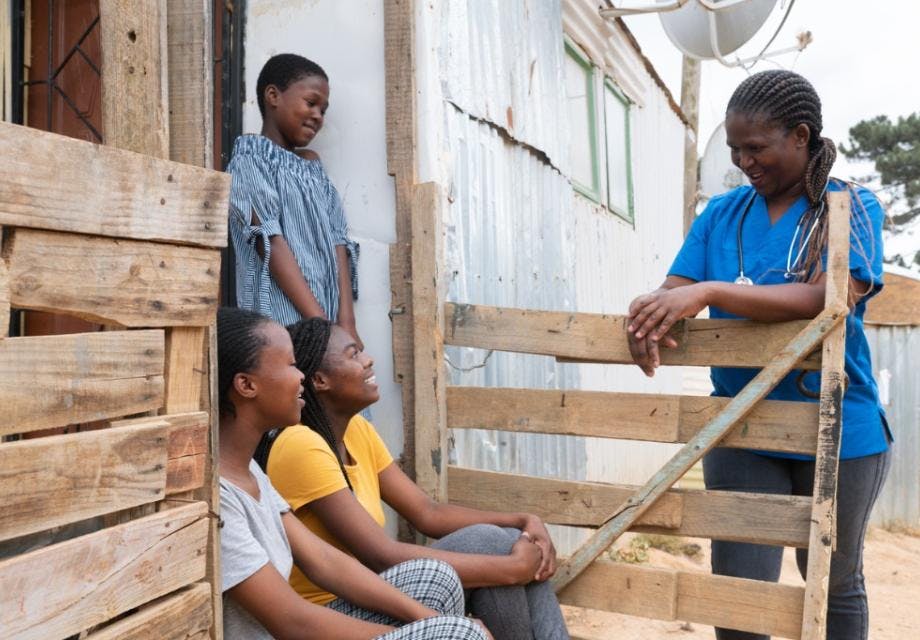Social support is key for young women’s PrEP adherence
Hester Phillips
12 May 2023
South African study finds that young women who take PrEP in secret or with little support tend to struggle to adhere
Young women who expect supportive reactions from family and friends about PrEP, and tell more people they are taking it, are more likely to take it correctly than those with less support, according to findings from a study in South Africa.
What is the research about?
The research looked at what helps adolescent girls and young women to take PrEP correctly to protect themselves from HIV.
Researchers interviewed 42 young women (ages 16-24) in rural and suburban areas in Eastern Cape Province where around 13% of young women have HIV. All had been taking PrEP for at least six months, and half had had sex in the last four months. Blood tests were used to see which young women were taking PrEP regularly enough for it to prevent HIV and which were not. PrEP should be taken every day to provide maximum protection.
Why is this research important?
South Africa was the first sub-Saharan African country to approve PrEP for people at high-risk of HIV, including young women. But introducing PrEP has not been as successful as hoped. Understanding why is important.
What did they find out?
Most young women told at least one person they were taking PrEP, normally their mother. But whether they told other people depended on the reactions they expected.
Young women with high adherence to PrEP
Young women with high PrEP adherence (four to seven doses a week) told more people they were taking it. And the people they chose to tell were spread across family, friends and partners.
These young women said family and others not only reminded them to take PrEP but also asked about side effects. This motivated their adherence. As 19-year-old Zintle said.
“People who are close to me support me very much in things that are related to PrEP… I’m happy because most of them are people who are important to me.”
Young women in this group spoke about taking PrEP to “protect their future”. They also told other young women about PrEP in order to help them.
Young women with low adherence to PrEP
Young women with low PrEP adherence (3 or fewer doses a week) tended to tell only one or two people they were taking PrEP, so they had less support.
Young women in this group expected negative reactions, including being told to stop taking PrEP. Asemahle, 18, said: “I was scared, thinking that she [mother] might force me to stop like other parents did to their children … At first, I kept taking it in secret …”
Most criticism came because the people they told did not understand how PrEP works. In some cases, people mistrusted all HIV-related medicine. Nomble, 17, said: “They were laughing at me, saying I will get sick from taking something that I don’t even know.”
Some young women in this group felt more closely watched and judged after sharing the fact that they were using PrEP because it suggested they were having sex. This was described as “draining.”
This criticism and judgement led some young women in this group to question their decision to take PrEP, and some stopped using it. In contrast, young women with high adherence also encountered criticism for taking PrEP. But they dealt with this by turning elsewhere for support.
Partner support
Most young women, whether they had high or low adherence, said their partner’s support (or lack of support) did not affect their decision to take PrEP. The reason most gave was that men could not be trusted to be faithful so they needed to protect themselves. Some also had multiple boyfriends so knew they were at higher risk of HIV.
What does this mean for HIV services?
It shows that making PrEP available to young women is not enough. The support for taking PrEP that young women have (or don’t have) also needs to be assessed.
For young women who won’t get support from family and friends, other kinds of support should be made available. Providing a peer supporter or a support group with other young women on PrEP could be effective. Building young women’s skills and confidence to find other sources of support if the first people they tell are critical of PrEP could also be effective.
Running a community-designed PrEP awareness campaign could also increase the number of people who are supportive of young women taking PrEP.
Get our news and blogs by email
Keep up-to-date with all our latest news stories and blogs by signing up to the Be in the KNOW news digest.
